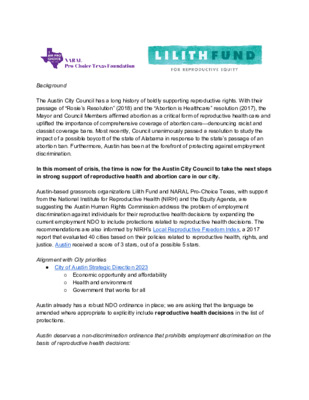Backup 20190923-4f (1) — original pdf
Backup

Background The Austin City Council has a long history of boldly supporting reproductive rights. With their passage of “Rosie’s Resolution” (2018) and the “Abortion is Healthcare” resolution (2017), the Mayor and Council Members affirmed abortion as a critical form of reproductive health care and uplifted the importance of comprehensive coverage of abortion care—denouncing racist and classist coverage bans. Most recently, Council unanimously passed a resolution to study the impact of a possible boycott of the state of Alabama in response to the state’s passage of an abortion ban. Furthermore, Austin has been at the forefront of protecting against employment discrimination. In this moment of crisis, the time is now for the Austin City Council to take the next steps in strong support of reproductive health and abortion care in our city. Austin-based grassroots organizations Lilith Fund and NARAL Pro-Choice Texas, with support from the National Institute for Reproductive Health (NIRH) and the Equity Agenda, are suggesting the Austin Human Rights Commission address the problem of employment discrimination against individuals for their reproductive health decisions by expanding the current employment NDO to include protections related to reproductive health decisions. The recommendations are also informed by NIRH’s Local Reproductive Freedom Index, a 2017 report that evaluated 40 cities based on their policies related to reproductive health, rights, and justice. Austin received a score of 3 stars, out of a possible 5 stars. Alignment with City priorities ●City of Austin Strategic Direction 2023 ○Economic opportunity and affordability ○Health and environment ○Government that works for all Austin already has a robust NDO ordinance in place; we are asking that the language be amended where appropriate to explicitly include reproductive health decisions in the list of protections. Austin deserves a non-discrimination ordinance that prohibits employment discrimination on the basis of reproductive health decisions: ●The Reproductive Health Non-Discrimination Act (RHNDA) protects individuals from being fired or facing other repercussions in the workplace because of decisions around their reproductive health. There have been a number of disturbing examples across the country of employers discriminating against employees because of their reproductive health decisions, such as having an abortion, using in vitro fertilization or birth control. ●In this current climate of attacks on abortion, this protection is needed more than ever. People need to know that accessing the abortion care they need – especially if it requires taking time off to travel long-distances to reach a provider – won’t jeopardize their job security. Furthermore, parents or partners who accompany individuals receiving abortion care should also be protected from discrimination or retaliation. ●Washington D.C. passed a similar ordinance in 2015. ●New York City passed a similar ordinance in 2018. ● St. Louis passed a broader, more far-reaching ordinance in 2017. ○The ordinance was challenged by religious organizations, and because of the judge’s interpretation of that ordinance - and it’s interactions with certain state and federal laws - held in 2018, that certain provisions could not be applied to the organizations that brought the lawsuit in October 2018. ●HB 1478, a state level RHNDA was introduced during the 86(R) Texas legislative session and received a hearing in International Relationships and Economic Development, but was left pending in committee.